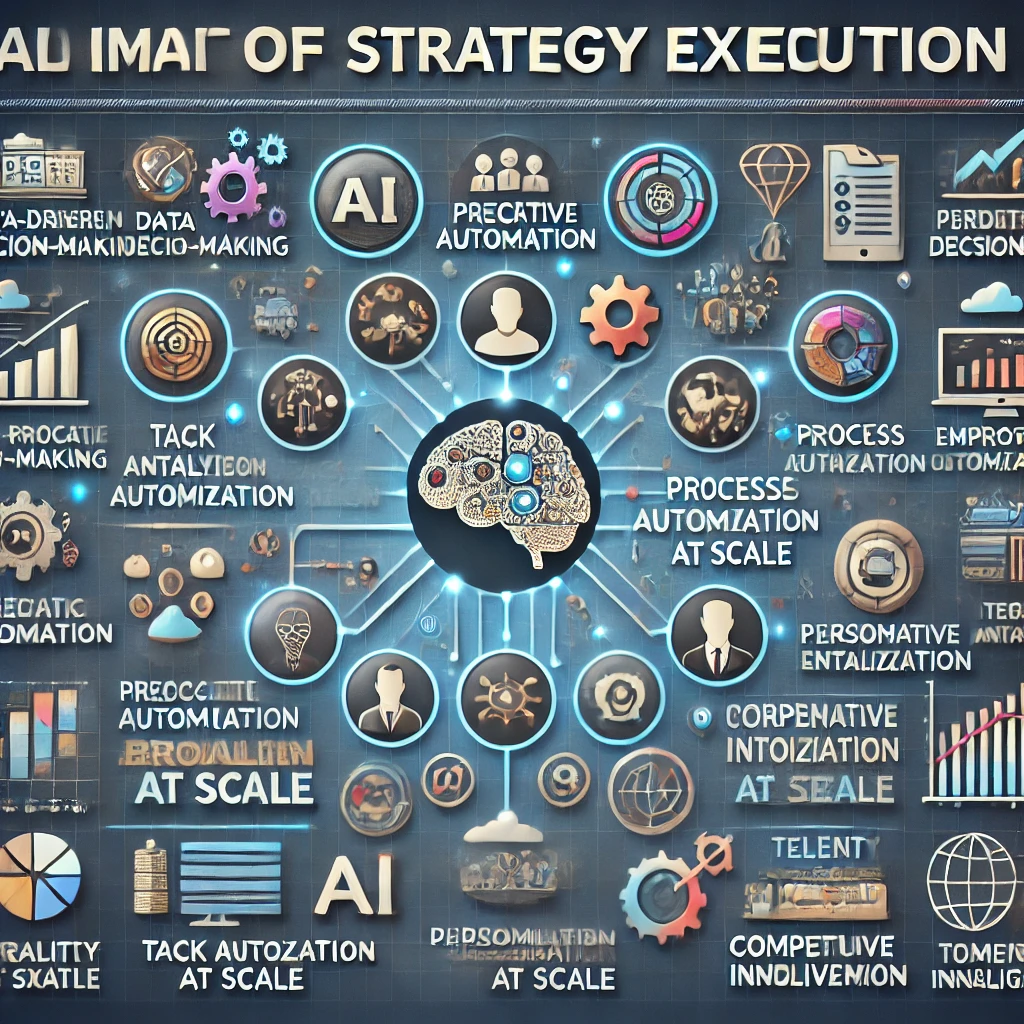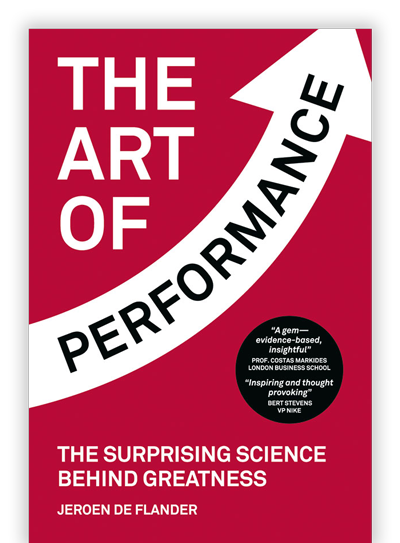Artificial Intelligence (AI) will significantly change how we execute our business strategy. How? By making processes more data-driven, efficient, and adaptable. This shift has made AI in business strategy execution a crucial topic every leader should dive into.
By integrating artificial intelligence in strategic planning, companies can harness predictive analytics, optimize resources, and foster innovation. Moreover, AI-driven business process optimization has become a game-changer, enabling enterprises to streamline operations and improve decision-making agility.

Here are some key ways AI will impact strategy execution and strategic planning:
1. Enhanced Decision-Making and Speed
- Data-Driven Insights: AI enables faster and more accurate decision-making by processing vast amounts of data. For example, Amazon uses AI algorithms to analyze purchasing trends and optimize inventory management in real time. It can detect patterns, trends, and anomalies, helping businesses make better-informed strategic decisions. By automating the data analysis process, AI reduces the time spent on manual research, allowing companies to make quicker adjustments and respond faster to market changes. This is a prime example of AI in business strategy execution in action.
- Predictive Analytics: With AI’s predictive capabilities, businesses can forecast future trends and outcomes with higher accuracy. This helps in anticipating market shifts, consumer demands, and competitive actions, which in turn accelerates strategic execution and minimizes risks. Artificial intelligence in strategic planning ensures these forecasts are integrated seamlessly into decision-making.
2. How Artificial Intelligence in Strategic Planning Enhances Operational Efficiency
- Task Automation: AI can automate routine operational tasks (e.g., customer service, supply chain management, and inventory optimization), which frees up valuable human resources to focus on higher-value strategic activities. This reduces costs and improves execution speed, ensuring that the strategy is carried out more efficiently.
- Process Optimization: AI algorithms can analyze workflows and suggest or implement improvements, leading to better resource allocation and streamlined operations. For instance, AI can help optimize manufacturing processes, enhance sales cycles, or automate HR tasks, ensuring that the company executes its strategy with precision. This demonstrates the power of AI-driven business process optimization.
3. Leveraging AI-Driven Business Process Optimization for Competitive Advantage
- Customer-Centric Strategies: AI enables businesses to personalize their products, services, and communications to individual customers at scale. By analyzing customer data, AI can offer personalized recommendations, dynamic pricing, and tailored marketing campaigns, helping businesses execute customer-centric strategies more effectively.
- Targeted Marketing and Sales: AI can enhance customer segmentation and targeting. It can identify niche segments, forecast customer behavior, and recommend personalized marketing strategies, improving the alignment between strategic goals and customer engagement efforts.
4. Improved Resource Allocation
- Optimal Use of Resources: AI tools can analyze data to ensure that resources (including capital, human talent, and time) are allocated most effectively across various strategic initiatives. This leads to better execution of multiple concurrent strategies, ensuring that resources are directed to the areas with the highest impact. AI in business strategy execution ensures that these decisions are backed by actionable insights.
- Dynamic Adjustments: As AI continuously analyzes performance and external factors, it can help organizations make real-time adjustments to resource distribution. For example, if an AI tool detects a decline in sales in one area, it can recommend reallocating resources to another more profitable segment or market. Artificial intelligence in strategic planning supports this agility.
5. Enhanced Collaboration and Coordination
- Cross-Departmental Integration: AI can foster collaboration across departments by providing a centralized platform for data sharing and communication. This ensures that all teams — from marketing to finance to operations — are aligned with the same strategic goals and can adjust their actions based on shared insights.
- Project Management: AI-powered project management tools can track progress, forecast timelines, identify potential roadblocks, and optimize team collaboration. This boosts execution efficiency and ensures that strategic initiatives are completed on time and within budget.
6. Agility and Flexibility in Strategy Execution
- Real-Time Monitoring and Adaptation: AI continuously monitors the execution of strategies and provides real-time feedback on performance. This enables organizations to remain agile by adjusting tactics or shifting focus quickly in response to new information, market conditions, or emerging opportunities. AI-driven business process optimization plays a crucial role here.
- Scenario Planning and Risk Mitigation: AI allows businesses to simulate multiple scenarios and assess potential outcomes. This helps companies prepare for various contingencies, ensuring that the execution of strategy remains flexible, even in the face of unforeseen challenges.
7. Enhanced Competitive Intelligence
- AI in Competitive Analysis: AI can collect and analyze data from a variety of sources (e.g., social media, market reports, competitor websites) to generate actionable insights about competitors’ strategies. For instance, Coca-Cola leverages AI to monitor social media trends and analyze consumer sentiment, enabling it to identify market opportunities and adapt campaigns accordingly. This helps businesses refine their own strategies and execute more effectively by being aware of competitors’ moves and market dynamics.
- Identifying Market Gaps and Opportunities: AI tools can identify gaps in the market or emerging trends by analyzing vast amounts of unstructured data. These insights can guide businesses in refining their strategies to better meet customer needs or capitalize on untapped opportunities, driving more effective execution. Artificial intelligence in strategic planning is invaluable in this regard.
8. Continuous Improvement and Feedback Loops
- Learning and Adapting: AI systems can continuously learn from data and feedback, allowing businesses to refine their strategies over time. The ability to analyze past executions and outcomes, identify mistakes, and adjust in real-time is a key benefit of AI that will drive more efficient and effective execution. AI in business strategy execution ensures continuous refinement.
- Automated Reporting: AI can generate automated performance reports, providing decision-makers with instant insights on how well strategies are being executed. This data-driven feedback loop accelerates the process of reviewing and adjusting strategies for continuous improvement.
9. Talent Management and Workforce Optimization
- AI in Human Resources: AI can support the execution of human resource strategies by identifying the right talent, predicting workforce trends, and optimizing team structures for strategic initiatives. It can help ensure that employees with the right skills are aligned with the company’s strategy, improving execution efficiency.
- Employee Performance Monitoring: AI tools can track employee performance and provide feedback to ensure that employees are aligned with the organization’s strategic goals. This leads to better execution by ensuring that everyone is contributing effectively.
10. AI-Driven Innovation
- Innovation Acceleration: AI can drive innovation by uncovering new technologies, processes, and solutions that align with business strategies. For example, pharmaceutical companies like Moderna used AI during the COVID-19 pandemic to accelerate vaccine development. By leveraging AI to analyze genetic data and simulate potential solutions, they significantly shortened the R&D cycle, helping the industry respond to a global crisis effectively. It can identify potential areas for improvement, product development, and innovation that may have been overlooked, helping companies stay ahead of the competition while executing their strategies.
- R&D Enhancement: AI can assist in research and development efforts by analyzing existing patents, publications, and research trends. This leads to faster innovation cycles and the development of new products or services that align with the company’s long-term strategic goals
AI will revolutionize strategy execution by providing businesses with the tools to be more agile, data-driven, and efficient in their actions.
Getting Started: Steps for Managers to Leverage AI in Strategy Execution
- Assess Your Organization’s Needs: Conduct a thorough analysis of your current strategy execution processes to identify areas where AI can add value, such as decision-making, resource allocation, or customer engagement.
- Invest in the Right AI Tools: Choose AI platforms and tools tailored to your industry and organizational goals. For instance, predictive analytics tools for market forecasting or automation software for operational efficiency.
- Develop a Data Strategy: Ensure your organization has access to clean, high-quality data. Establish protocols for data collection, storage, and analysis to maximize AI effectiveness.
- Upskill Your Workforce: Train your team to work with AI technologies. Provide education on how to interpret AI-generated insights and integrate them into decision-making processes.
- Start Small and Scale: Begin with pilot projects to test AI applications in specific areas. Use the results to refine your approach before scaling AI integration across the organization.
- Monitor and Optimize: Continuously monitor AI performance and gather feedback to make improvements. Establish feedback loops to adapt strategies based on AI-driven insights and outcomes. By enabling faster decision-making, automating processes, optimizing resources, and enhancing competitive intelligence, AI empowers companies to execute their strategies more effectively and respond to market dynamics with unprecedented speed and precision. As AI becomes more integrated into business operations, companies that embrace these technologies will have a significant edge in achieving their strategic goals.



